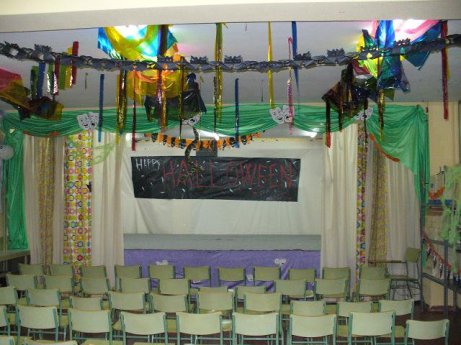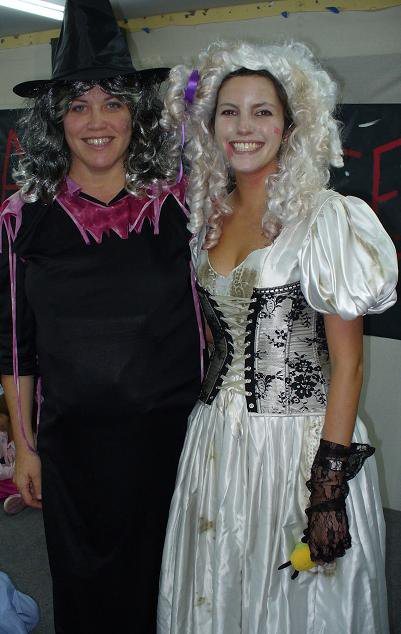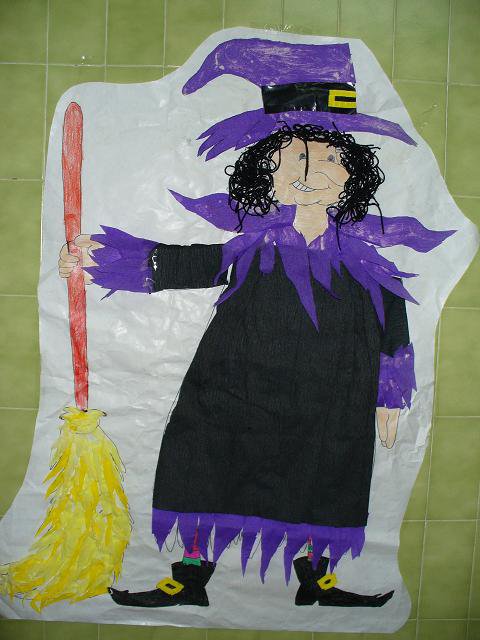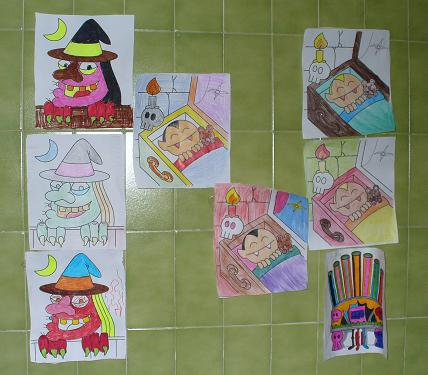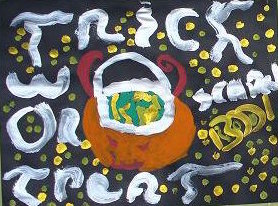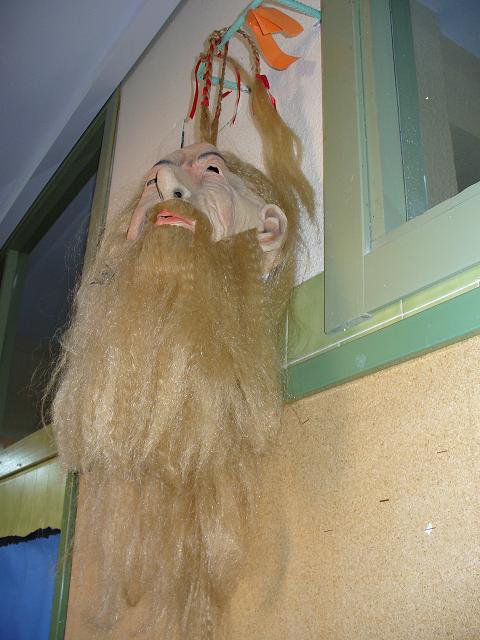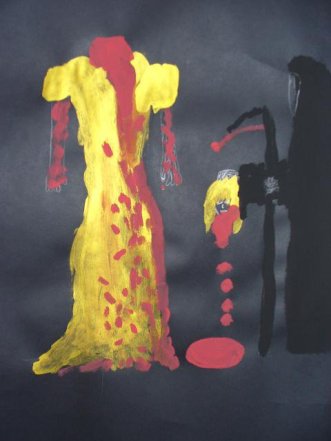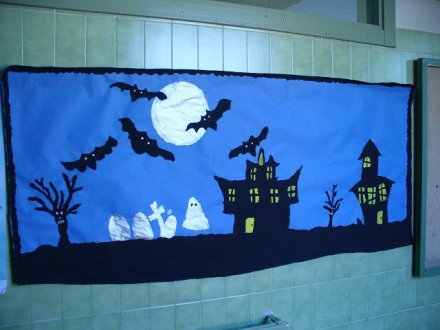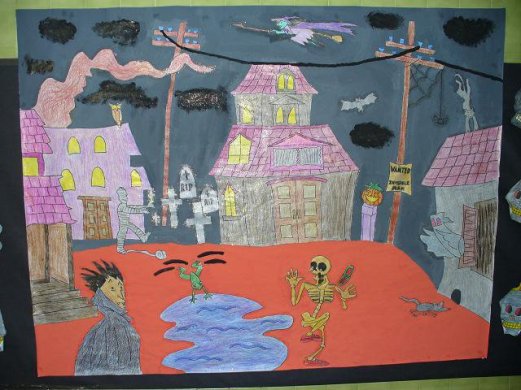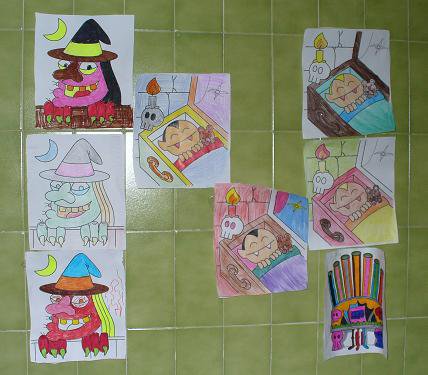February 7, 2010
Hola a Todos,
There were many things to do to prepare for Christmas and The Three Kings (January 6). The teachers and students decorated the school corridors, and I volunteered to help my team teacher paint big signs to hang just outside our classrooms, as she doesn’t like arts and crafts and I do, depending on the medium.
Although I don’t excel at drawing or painting, I very much like to try to do both, so I went to the English classroom, poured red paint and green paint into separate plastic cups, got down on the floor with my big sheets of white paper, and wrote Merry Christmas on one and Feliz Navidad on the other. I figured that if the writing wasn’t perfect, I could paint over any mistakes. And if my writing looked like that of a second-grader’s, all the better, so I painted both signs, my team teacher very much impressed not only by my writing but also by my dotting the i’s in Christmas, Feliz and Navidad, with a yellow-painted flame. Genius, I know.
The students colored wreaths, bells, and all sorts of Christmas pictures. During a couple of classes, we helped them make holiday cards to give to their parents: we handed out colored paper to each child, instructing them to fold the paper in half. Then on the board I wrote:
Dear Mom and Dad (if they had both parents),
Merry Christmas
and a
Happy New Year!
Love, [Child’s Name]
The students were to write this message in pencil on the inside of their now-doubled-over colored paper. I was amused that several of them had signed their name on the holiday card as if they were a grown-up signing a credit card: after they had written their name, they scribbled over the signature. I asked the teacher why they did that, and she said, “They love it!”
After my team teacher and I had checked each holiday card for mistakes and legibility, the students traced over their letters with a colored marker of their own choosing. I had set up a desk in the back with three chairs, and two students at a time came to sit with me and view the sample holiday card the teacher had drawn and painted (complete with inside message): snowman, with branches for arms, buttons, eyes, nose, and mouth, a hat, a scarf, and falling snow. Then they were to create their own holiday card, with my help. The children who normally act up in class — about 30% of them — were amazingly good and patient when I was helping them in the back of the classroom with this project. The reason? It was fun, creative, and directly related to them.
To avoid paint-tipping-over chaos, I kept the plastic cups with the paint in a cardboard box and asked each student which color paint he or she wanted to use next. I didn’t initially come up with this brilliant idea: I had to suffer through several near-paint-spills to figure out a way to release myself from the agony of constantly hovering over the plastic cups of paint, ensuring that they didn’t spill because of impatient, attacking, little fingers.
Starting with white, I painted only the top line of the snow-covered ground and, for the snowman, a big circle and a small circle atop the big one — just so that they had some structure and we could get the job done quickly, as I had to work with 25 students in each class. The students painted the rest of the ground and inside the circles. They picked whatever color paint they wanted — black, brown, yellow, white, and red — for the rest of the card, the activity serving as both a creative and English lesson in colors and names: “What color do you want for the arms [eyes, nose, mouth, buttons, scarf, tree, snow, etc.]?” I told each student how wonderful their paintings were, and I meant it, even though a few of them looked kind of scary, with lots of black and brown.
One boy, who only occasionally seems to know what’s going on in English class, surprised me. This boy jokingly and daily makes crazy gestures and faces at me during class, and the girl who used to sit beside him would point to her temple, making circles with her index finger as in “He’s crazy,” but I later found out from the teacher that actually he should be in a special education class but that those schools don’t have enough room. His was the best card in terms of, well, representation. Amazed, I told my team teacher, and she says he’s really very good at art. I was glad he is good at something. I often sit and help him with his English and notice the light only sometimes goes on. All I can do is, while encouraging him, try to ignore his inattentiveness and growling, and wait for him to flip his “on” switch. At least he seems to have a good personality, because after he growls and I growl back at him, he smiles, getting a major kick out of my response. Sometimes he pushes me away, and after a while, I walk away.
I noticed that, the next day, my “Merry Christmas in two languages art” had been hung on the wall outside our second-grade glasses. I taped the student holiday cards to the wall to complete the look. Simple, but cheery. One very sweet student presented me with his family Christmas card, on which was a small picture of his mother, father, brother, and him. I think he gave a card to all of his teachers.
We English teachers had to teach the students six songs, some of whose lyrics they already knew: We Wish You a Merry Christmas, Silent Night, Jingle Bells, Rudolph the Red-Nosed Reindeer, Santa Claus is Coming to Town, and Feliz Navidad. The second graders, at least, didn’t have the lyrics on a piece of paper in front of them because my team teacher said that they would lose them, so I wrote the lyrics on the board. I said a line, and the students repeated it; I sang a line, and they did the same. Although I’m frightened to death of singing at open mike, maybe because it’s much more intimate and personal, I am not in the least bit afraid of standing in front of a class or even the whole school and singing. The team teacher also sang while I walked around the class and sang loudly so that the students could hear my pronunciation.
The week before the Christmas concert, the English teachers and I went to the gym to help the students practice the Christmas songs, us English teachers leading the students, the British English teacher playing the guitar. I noticed that he had a very good voice, and he informed me that one of his parents, like mine, was a classical musician. The students were pointing at me, whispering to their friends, amazed that I could sing Feliz Navidad in Spanish, not realizing that it’s just a few words (if you say “hola” to them, they think you’re bilingual!) and also not knowing that Jose Feliciano had made this song very famous decades earlier.
We also had Secret Santa at school, which the Spanish call “Amig@ Invisible” (“Invisible Friend”) — the @ designating Amigo or Amiga. So I was the Secret Santa for a teacher I had almost never seen. I bought her cranberry soap, chocolates, lavender sachet, lavender votive candles having heard she loves the color purple — and aqua and dark-blue potholders. Each gift was only 1 euro or less (about $1.50). The main gift, to be put into the Secret Santa box on Tuesday, December 22, was supposed to cost about 15 euros, about $22. Because I didn’t really know a thing about her, I bought her something generic: a bath set of soap, shower gel, lotion, etc. — in the color purple.
The Christmas program — a Christmas, New Year’s Eve, and the Three Kings Spanish-and-English-song combo — was a big deal because the parents came to the school to see their little ones sing in both languages. The rumor was that everybody was to dress up as if it were New Year’s Eve — this meant jammies for me — but before the big day, I had asked a few teachers what we were to wear. A couple of them responded to dress smartly, and one of the male teachers joked that the female teachers get their hair done so that it looks better than usual. Another teacher said she was just going to wear what she usually wears, which I guess would be tight faded jeans, boots and a tee shirt that says “My day!” Another said that some of the teachers wear long dresses. I think I can remember having owned two long dresses in my life: A “Maxi,” a long yellow dress with small flowers I had worn as a 12-year-old sixth grader in 1973. I had sewed it myself and, along with Maxi-dress wearing Judy Oussoren and Mary Beth Piper (as I recall), wore it to school. (During elementary school, we usually called up our friends to see what they were wearing the following day and, equally importantly, if they were going to “buy” or “carry” their lunch.) Then, for my 20th high school reunion in Gettysburg, Pennsylvania — don’t ask me why I got so dressed up — I wore a long, slit-up-the-leg lavender dress. I’ve been a bridesmaid in two friends’ weddings, so I wore long dresses then, but that just about sums up my long-dress-wearing history. And I wasn’t about to go out and purchase a long dress, partly in the face of so many conflicting stories but mostly because I can’t afford to purchase even a shirt. I figured that the focus would be the students, not me, and I would get my first manicure in four months, dress nicely, wear some makeup (some days I don’t even bother with it), and maybe even curl my hair.
During the week before we revealed ourselves to our Invisible Friend, some of the teachers were getting little presents or fun notes from their Secret Santa. (A Mr. Jon C. Lundell told me he had thought that an “Invisible Friend” was a girl’s period. I responded that our period was just our friend, not our invisible friend; maybe it was our visitor: I can’t remember now.) I still had not received a thing, which I joked didn’t bother me, considering I had spent more than half a year in Chicago getting rid of my stuff so that my condo would be cleared out for a potential tenant. However, I was starting to wonder if I had been forgotten or if I really had a Secret Santa — not that this was a critical world problem. On the Thursday before the present-opening day, I hadn’t received even a little note. Then two first-grade girls brought a present up to the science class I team teach, but they gave the present to my Spanish team teacher, who proceed to open it while the students were doing their homework. It was a Hershey’s peanut chocolate bar, with a nice note from the Secret Santa, something about how when you smile, it lights up everybody’s life and makes everybody feel better. I had thought that that was a really nice note and how great it would have been had it been my present, partly because of the beautiful message and partly because of the creative presentation: a surprise from two adorable girls. Still, I enjoyed my team teacher’s happiness and took the wrapping from her so I could recycle it.
Then since my team teacher couldn’t figure out something I had asked her about my cell phone, she suggested I run down to ask a Spanish English teacher who, she said, knew about these things. I found the other teacher and asked her about the cell phone, while commenting on how two cute girls had come up to give my team teacher a big Hershey’s bar. She said, “That present was for you!” while running up to my team teacher’s classroom, entering the room and explaining to her — in front of the class, mind you — that the present was mine. The team teacher apologized to me for taking it: apparently, the little girls had dropped the little name card on their way to bring it to “us.” I ended up giving the Hershey’s chocolate to an American friend of mine. I tell you, I just wanted to be remembered, I guess. The teacher whole told me the present was for me had given the present to the girls because she knew I hadn’t received anything so far and had found it in the later that day and wanted to make sure I had gotten it before I left for the week.
On Friday, December 18, in the morning, I stood in line at the police station to present documents so I could finally get my Spanish ID card on January 18. That night, 14 teachers, including me, met in front of the school to dine together at a restaurant in the area. Our dinner consisted of salad, salmon, bread, wine, champagne, and other food I can’t very well remember, because the meal was just so-so, I thought, but we had a nice time. I was getting concerned about how late the train would actually be running. Having stayed out all night in Tokyo a few times because all the trains stopped running around 1 a.m. and a taxi back to Yokohama was about $100, I am not a fan of being out all night, waiting for a train to start up at 5 a.m. Since almost everybody else lived in the area, no one else had the same dilemma, except one of the 21-year-old American English teachers, who later told me she was glad I had been concerned, as we definitely would have been stuck had we left any later. I decided I needed to go, and a Spanish English teacher was kind enough to drive me and the other American to the closest Metro station.
We took the train to Madrid, our train arriving at the Metro station Principe Pio, which was relatively close to my Metro station, Opera. We ran to make our respective connections, but the last train was pulling into the station for the night, just as I was approaching it. Earlier, the American teacher had told me I could catch a bus, so I walked a couple of blocks with the crowd to a bus stop and queried about the schedule, unsure of how to read it. She directed me to the “N” (“Noche” or “Night”) schedule. I waited for the bus for about 20 minutes, watching all the drunk people, kissing couples, guys peeing behind trees, people yelling to each other. I just wanted to be home in bed, but I figured this would be the only time I would experience very-late-night/early-morning Madrid, and I would at least understand the bus system better. I took the bus to Gran Via, a shop-filled, huge street close to my Metro station, and walked the rest of the way via Sol. I guess the partiers had decided to trash the place because all along my walk, but especially on Calle Arenal, there were huge piles of trash all over the place. Stunned and disgusted, I tried to find a clear path for walking. I have never seen anything like this in the United States, but then again, even though I live only two blocks from Division Street in Chicago, I never hang out there late at night to see what really goes on — and I never plan to. At any rate, the cleaners had their work cut out for them, and they manage to destroy the evidence, as Calle Arenal is always back to normal by daylight.
On Monday, December 21, we teachers practiced the songs with the students, and on Tuesday, we had the Christmas program, which was to start at about 10 a.m. The parents were waiting on the sidewalk, a locked gate to keep them from rushing in to get a front-row view of their child’s performance. The kindergartners, then the first graders, then the second graders, and last, the third graders. The fourth, fifth, and sixth graders were in the auditorium with their parents. The children were all dressed differently: some of the girls were wearing lots of make-up — one American teacher noted that one of my second-graders looked like a child prostitute, and I had to concur — and glittery dresses, while others were dressed in their normal school wear. Some of the boys were wearing suits, some jeans. The concert was held in the gymnasium, and the parents herded in and were roped off. As there were no chairs, they had to stand up. There was a gym ladder on the side walls, and a few of them were climbing the ladder to get a better look at the performance. There were already columns blocking the parents’ view, and I figured since I wasn’t watching my child, I would sit on the floor to avoid blocking their view. Remember my bad knees and feet? Not an easy task for me to get up and down, as well as sit on a gym (or any) floor in a nice skirt. I then sat on the side bench between two of my second-grade boys, one of whom kept trying to pull the curled ribbon, which I had difficulty trying to subdue as it kept springing out of my grip. I was to throw it later when we yelled “Happy New Year!” right there in the gymnasium, almost 10 days early.
After this chaotic, but o so cute, performance, there were message on a screen in Spanish, and then we counted down to the New Year and yelled “Happy New Year!” and some of the teachers, also equipped with the springy ribbon, threw the ribbon and candies up into the air for the children to scramble after. We then returned to the classrooms for our normal break at 11:30 a.m. and the cafeteria “ladies” brought us pitchers of chocolate and plastic bags of churros. I was pouring little plastic cups of the chocolate for the students and handing out the churros. While I actually have pretty healthy eating habits, I think I might have a dangerous addition to churros, as I must have eaten about 7 them, wanting to eat more but hoping they would vanish, my not being the culprit. While we were enjoying our treats, the students, who also had an Invisible Friend (a fellow student), were busy opening presents. One boy looked none too happy that he received a picture frame or something of that ilk, although I tried to make a big deal about it, while another had gotten a Nerf-type basketball set. Then they snatched their note to give to The Three Kings, who were now in the auditorium, with the parents now watching each child go up on stage to sit on the lap of one of The Three Kings. So we hurried back to the gym to watch the students form a line, each approaching one of the Three Kings, sitting on his lap, giving him the note, and telling him how good he or she had been all year. For a couple of students, I wanted to intervene, sorry I wasn’t equipped with a videotape of their behavior during some of our classes, but I didn’t want to give them the big chance to learn how to lie to an authority figure. It might serve them well later in life.
A little after noon, we teachers went to the music classroom, sat in desks set in a big circle, and enjoyed our own Secret Santa, all the gifts being in a big box at the front. The Spanish English teacher in charge of the activity called up the next person to receive his or her gift. I had been starting to think my Secret Santa was the “very-nice-and-doesn’t-know-he’s-funny-but-he-always-cracks-me-up” British English teacher I like very much. First of all, he had written his note to me in Spanish and English that needed no help, plus he had learned I had never eaten a Kinder chocolate, because we had talked about it at break, and one of his little presents to me was a Kinder chocolate. My present, a book in English entitled Winter in Madrid, was indeed from him. Other teachers received such gifts as scarves, a fun (Hello-Kitty-type) top for a teacher that wears this sort of thing, pajamas, chocolates, and alcohol, etc.
Then we all gathered for a nice lunch in the staffroom: shrimp, salmon, fried squid, bread, salad, vegetables, flan, chocolates, a big bowl of fruit, coffee, and tea. At the parallel table, two female teachers kept turning around to listen to our table’s conversation, but also throwing paper wads at other teachers or putting salt in the water glass of the gym teacher sitting across from me. Everybody knew that they were goofing off and were ready for their pranks. I kept watching to see what the gym teacher would do once he returned to his seat. All he did was look at his water glass, commenting that he knew they had done something to it.
Although the day and dinner were pleasant, I was tired and ready to head home. This was another noisy but fun-filled day. And although I didn’t actually receive any presents at Christmas this year, besides my Secret Santa’s present and a present from an American friend here (Note: My stepmother had asked me if I wanted anything and I said “no”), I will always have the gift of participating in and remembering the preholiday festivities in Spain, a gift money can’t buy, a gift I will always cherish.
Internationally yours,
International Girl in Spain




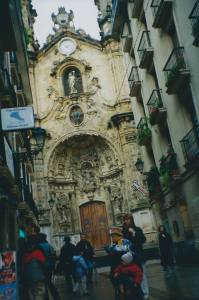
 looked stupid, so I worked on my crossword puzzles. (A former coworker had given me two crossword-puzzle books at my going-away party last September, and I have definitely used them.) Soon it was snowing, and we were driving much more slowly, my seat partner now awake and discussing every turn with the bus driver, who was sometimes on the phone discussing the weather and what he should do. From what I could tell, the woman wasn’t annoying him: she was just rambling on about the weather with him and then, when we reached San Sebastian, thanked him for helping us arrive safely to our destination under somewhat treacherous conditions. I, too, thanked the bus driver, and I almost thanked my seat partner for exiting the bus.
looked stupid, so I worked on my crossword puzzles. (A former coworker had given me two crossword-puzzle books at my going-away party last September, and I have definitely used them.) Soon it was snowing, and we were driving much more slowly, my seat partner now awake and discussing every turn with the bus driver, who was sometimes on the phone discussing the weather and what he should do. From what I could tell, the woman wasn’t annoying him: she was just rambling on about the weather with him and then, when we reached San Sebastian, thanked him for helping us arrive safely to our destination under somewhat treacherous conditions. I, too, thanked the bus driver, and I almost thanked my seat partner for exiting the bus.

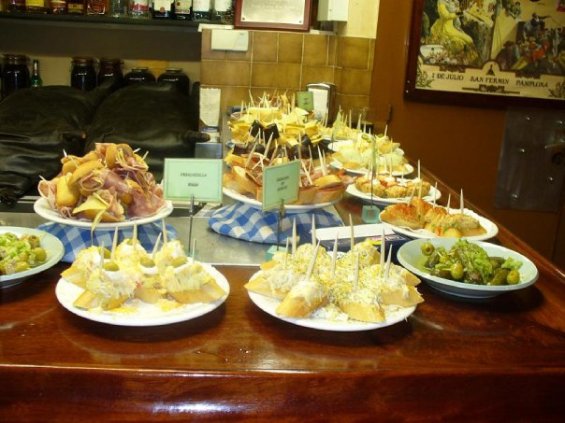


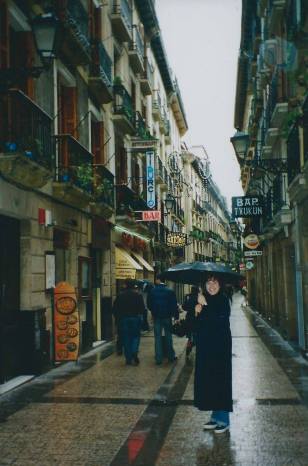



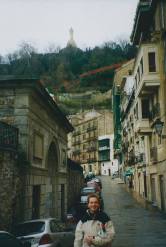
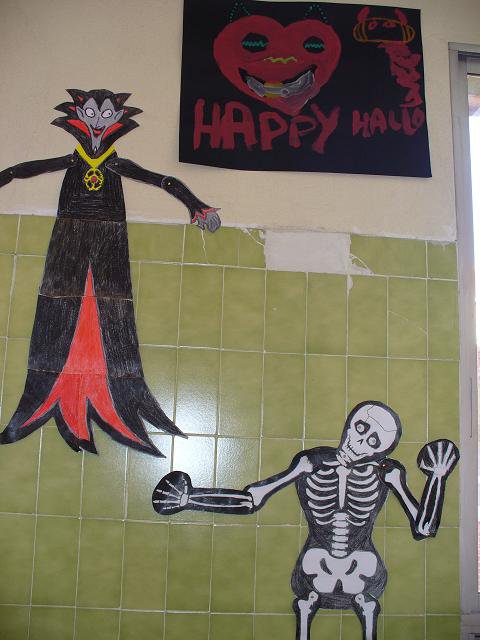

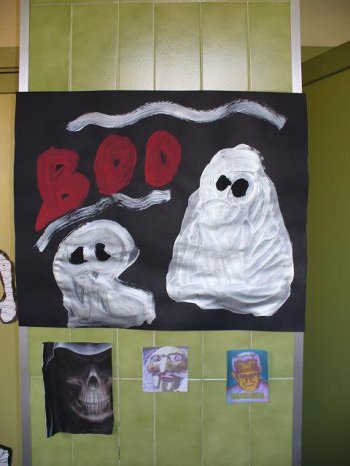 ay, we English teachers — Spanish, American, and British — held three meetings conducted mostly in Spanish. I understood maybe half of the plans, so after each meeting, I had to confirm what had transpired; however, like everyone else, including the Spanish English teachers, I was still unclear about how the day’s activities were to unfold (unravel is perhaps a better word). All I knew was that I was selected to be the old witch in a story about an old woman who swallows various bugs/animals to kill the previous creature she has swallowed: She first swallows a fly, then a spider to kill the fly…followed by a cat, dog, goat, and cow. Finally, she chows down on a horse, an act that causes her death. We had toy animals to show the kids so that they could connect the animal to its name in English, but our horse was about 1/4 the size of the cat — and the stuffed spider was a huge, scary black animal, much bigger than the horse and cow put together. But I didn’t care about any of this: I was concerned only with two questions that kept popping up, at least in my mind: “How was I selected, without hesitation on anybody’s part, to be the old witch, and why wasn’t anybody else even in the running?”
ay, we English teachers — Spanish, American, and British — held three meetings conducted mostly in Spanish. I understood maybe half of the plans, so after each meeting, I had to confirm what had transpired; however, like everyone else, including the Spanish English teachers, I was still unclear about how the day’s activities were to unfold (unravel is perhaps a better word). All I knew was that I was selected to be the old witch in a story about an old woman who swallows various bugs/animals to kill the previous creature she has swallowed: She first swallows a fly, then a spider to kill the fly…followed by a cat, dog, goat, and cow. Finally, she chows down on a horse, an act that causes her death. We had toy animals to show the kids so that they could connect the animal to its name in English, but our horse was about 1/4 the size of the cat — and the stuffed spider was a huge, scary black animal, much bigger than the horse and cow put together. But I didn’t care about any of this: I was concerned only with two questions that kept popping up, at least in my mind: “How was I selected, without hesitation on anybody’s part, to be the old witch, and why wasn’t anybody else even in the running?”